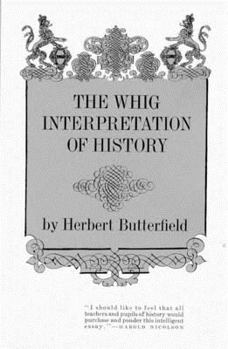The Whig Interpretation of History
Select Format
Select Condition 
Book Overview
It is not as easy to understand the past as many who have written it would have us believe. The historians who look at it from the Protestant, progressive, "19th Century gentleman" viewpoint are defined by Professor Butterfield as "the Whig historians." The Whig historian studies the past with reference to the present. He looks for agency in history. And, in his search for origins and causes, he can easily select those facts that give support to his...
Format:Paperback
Language:English
ISBN:0393003183
ISBN13:9780393003185
Release Date:September 1965
Publisher:W. W. Norton & Company
Length:144 Pages
Weight:0.85 lbs.
Dimensions:0.4" x 5.3" x 7.6"
Customer Reviews
5 ratings
Essential reading for any student of history
Published by Thriftbooks.com User , 17 years ago
An excellent warning of common historical fallacies. A must for developing a mature understanding of proper historiography .
Great Reading for History Grad Students
Published by Thriftbooks.com User , 17 years ago
"The Whig Interpretation of History" is superb meditation on the craft of history and how it can be distorted by "whig history." This was how Herbert Butterfield described historians who project modern attitudes on to the past, pass moral judgments on historical figures, and regard history as significant only to the extent that it labored to create the modern world. Butterfield regarded "whig history" as the antithesis of real history, which glories in the sheer "differentness" of the past and attempts to understand past events and people in the context of their own time, not of ours. Butterfield's writing was eloquent, his thought profound, and his temperament humane. His book, although old, is a genuine classic, to be treasured by all historians and readers of history. Highly recommended.
Gettin' Whiggy With It
Published by Thriftbooks.com User , 18 years ago
I'd always fancied myself more of a Tory until I read this book. It's changed my outlook on life. I mean, in a perfect world, I'd be a Constitutional Monarchist. But hey.
An enjoyable explosion of Whig pretension
Published by Thriftbooks.com User , 23 years ago
On reading histories of the nineteenth century, one cannot help but note that the historians believed that all the clashes of history inevitably led to the apotheosis of virtue in the person of the Whig gentleman. Sir Butterfield adeptly demolishes such a naive, though entrenched, approach to historical documentation, noting that the chaos of history, whether provoked by the Reformation or by English politics, in no way consciously intended many of its results. Religious liberty, for instance, was not a conscious aim of the Protestant Reformation, but a byproduct of the brutal wars over religion which scarred Europe for a century. It is only in the deforming glasses of Whig interpreters that the Protestant Reformers appear as advocating everything whiggish.Butterfield does have a few of his own biases, speaking in the magisterial "we" when declaring our age a secularized one, or speaking of alleged Catholic irrationality. But these are minor faults, and easily accounted for, hardly marring lthis excellent essay.
Interpretation of history : Whig and Tory
Published by Thriftbooks.com User , 24 years ago
My review will be in french (my mother tongue) and english. The english parliamentary history in England was under two interpretations (Whig or Tory), but the Whig interpretation tooks the first rank in the interpretation of this event. Butterfield have a profound look about the historiography of the historian like an avenger. At the end, the question is not a problem for the philosophy of history but a problem « of the psychology of the historian ». In the same sense, E. H. Carr wrote also : « Before you study the history, study the historians."Mon compte rendu sera en francais (ma langue maternelle) et en anglais. L'histoire du parlementarisme britannique est liee aux interpretations Liberale ou Conservatrice, mais c'est l'interpretation liberale (Whig) qui a domine la scene de l'intrepretation de l'evenement. Butterfield nous offre un point de vue intelligent au sujet de l'historien comme "vengeur" du passe. A la fin, la question n'est pas un probleme de philosophie de l'histoire, mais une question de "psychologie de l'historien". Dans le meme sens, E. H. Carr a ecrit : "Avant d'etudier l'histoire, il est mieux d'etudier l'historien." (Texte en francais sans accent.)




